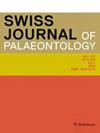A redescription of Brouffia orientalis Carroll & Baird, 1972 from the Upper Carboniferous of the Czech Republic and the status and affinities of protorothyridid amniotes
IF 3
2区 地球科学
Q1 PALEONTOLOGY
引用次数: 0
Abstract
The Upper Carboniferous protorothyridid amniote Brouffia orientalis from Czech Republic is redescribed. Photogrammetric scanning of the holotype and only known specimen yields considerable new information on the skull and postcranium of this tetrapod and allows us to amend previous morphological descriptions to a substantial degree. A virtual 3D model built from photogrammetry scan data is used as the basis for a new reconstruction of the skull in dorsal, lateral, and ventral aspects and the lower jaw in lateral aspect. We expand and refine the diagnosis of Brouffia and compare it with other protorothyridids. We discuss the affinities of this taxon by coding it in a recently published data matrix of early amniotes, which we subject to maximum parsimony and Bayesian fossilized birth–death analyses. Brouffia emerges as the sister taxon to Coelostegus in all analyses, but the position of these two taxa within amniotes varies. In a parsimony analysis with unweighted characters, the (Brouffia + Coelostegus) clade forms the sister group to Synapsida. In various experiments of character reweighting, that clade is placed crownward of Captorhinidae on the stem-group of Reptilia, but anticrownward of remaining protorothyridids. The latter constitute either a paraphyletic array relative to Diapsida or their monophyletic sister group. The Bayesian analysis retrieves (Brouffia + Coelostegus) as the most basal plesion on the stem-group of Reptilia.重新描述捷克共和国石炭纪上层的 Brouffia orientalis Carroll & Baird,1972 年,以及原甲壳类羊膜动物的地位和亲缘关系
本文重新描述了产自捷克共和国的上石炭世原齿兽类羊膜动物 Brouffia orientalis。对主型和唯一已知标本进行的摄影测量扫描为这一四足动物的头骨和后颅骨提供了大量新信息,使我们能够在很大程度上修正以前的形态描述。根据摄影测量扫描数据建立的虚拟三维模型是头骨背侧、侧方和腹侧以及下颌骨侧方新重建的基础。我们扩展并完善了对 Brouffia 的诊断,并将其与其他原齿兽类进行了比较。我们在最近发表的早期羊膜动物数据矩阵中对该类群进行了编码,并对其进行了最大解析和贝叶斯化石生死分析,从而讨论了该类群的亲缘关系。在所有分析中,Brouffia 都是 Coelostegus 的姊妹类群,但这两个类群在羊膜动物中的位置却各不相同。在使用未加权特征的解析分析中,(Brouffia + Coelostegus)支系是合子类的姊妹类群。在不同的特征加权实验中,该支系被置于爬行纲干支类中 Captorhinidae 的冠向,但与其余的原尾目相对。后者要么构成了相对于双翅目的旁系群,要么构成了它们的单系姊妹群。贝叶斯分析结果表明,(Brouffia + Coelostegus)是爬行纲茎群中最基干的一个类群。
本文章由计算机程序翻译,如有差异,请以英文原文为准。
求助全文
约1分钟内获得全文
求助全文
来源期刊

Swiss Journal of Palaeontology
Earth and Planetary Sciences-Paleontology
CiteScore
4.30
自引率
16.70%
发文量
17
审稿时长
4 weeks
期刊介绍:
The Swiss Journal of Palaeontology publishes original research and review articles of interest to the international community in the fields of palaeontology, taxonomy and systematics, while recognising at the same time the importance of documenting high-quality palaeontological data in a regional context. Palaeobiology in combination with alpha taxonomy is a core topic of the journal.
Submitted papers should have an appeal as wide as possible, directed towards an international readership. Contributions should not have been simultaneously submitted elsewhere, and the overlap of content between related articles should be minimal. Duplications of text and the use of previously published illustrations without adequate citation are unacceptable. If a manuscript has two or more authors, both or all have to sign to confirm they all were involved in the work and have agreed to its submission. The preferred manuscript language is UK English, but consistently used US English is also acceptable. We encourage the publication of proceedings of international meetings as well as special thematic issues. Short contributions and book reviews are also accepted.
An international editorial team as well as guest editors guarantee that the thematic issues as well as all articles in regular issues are peer-reviewed and meet the highest standards.
 求助内容:
求助内容: 应助结果提醒方式:
应助结果提醒方式:


